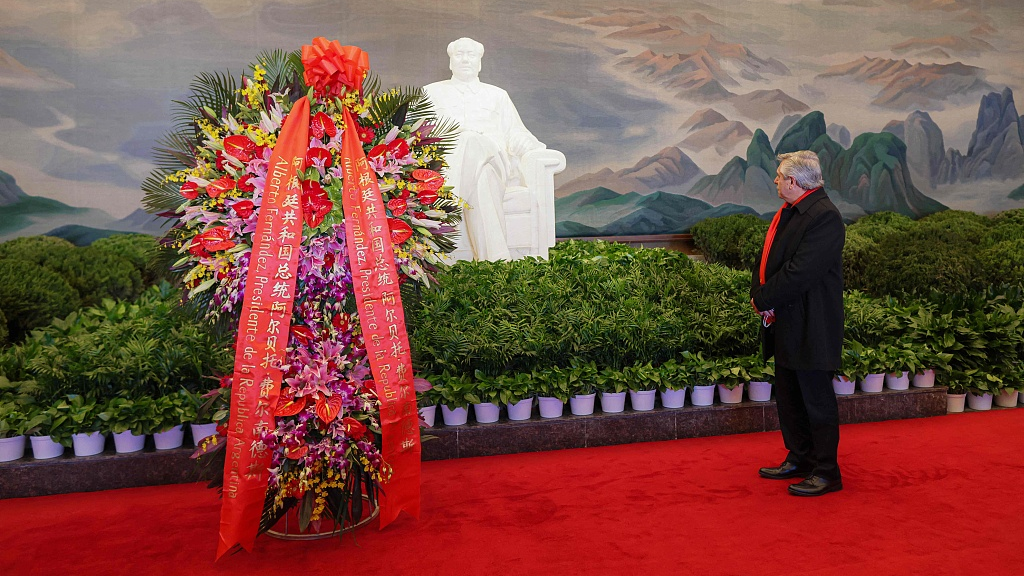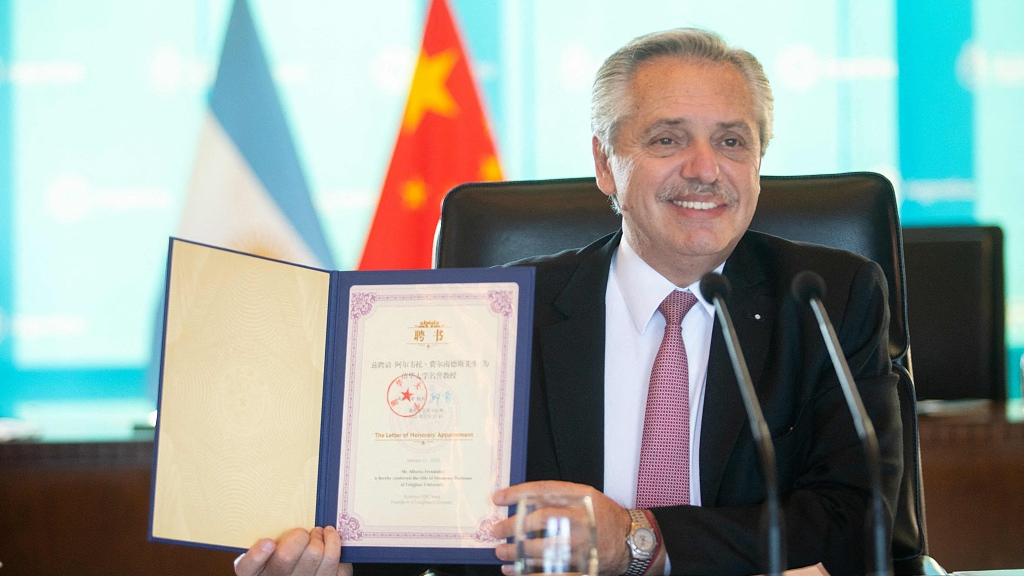
Argentinian President Alberto Fernandez stands during a wreath-laying ceremony at the Mao Zedong Mausoleum in Beijing, China, February 5, 2022. /VCG
Argentinian President Alberto Fernandez stands during a wreath-laying ceremony at the Mao Zedong Mausoleum in Beijing, China, February 5, 2022. /VCG
Editor's note: Elias Jabbour is a professor in the Faculty of Economic Sciences at the State University of Rio de Janeiro. The article reflects the author's opinions and not necessarily the views of CGTN.
Argentina is a large South American country that during the late 19th century was one of the five largest economies in the world. One of the most cultured people around, large portions of its population are characterized by a fierce way of fighting and thinking about their country. From the Argentine Republic, a political concept as interesting as strategic was born: "popular nationalism."
This concept is born of a so-called Peronism, alluding to the Argentine nationalist leader Juan Domingo Peron, and it takes on stronger contours with the first wave of popular governments in Latin America that began with the election of Hugo Chavez in Venezuela, Lula da Silva in Brazil and Nestor and Cristina Kirchner in Argentina. This political mark returns to the center of Argentine politics with the election of the Peronist Alberto Fernandez to the top office of the Argentine nation.
But the fact is that Argentina is also a country marked by a lack of direction. If Brazil became an industrial power in five decades (1930-1980), Argentina saw its position in the international division of labor become increasingly vulnerable. The process of industrialization through import substitution, which was very strong in Brazil and Mexico, did not have the same depth in Argentina. External dependence, mainly on agencies such as the International Monetary Fund (IMF) led the country to transition from a military dictatorship (1976-1983) to savage neoliberalism during the Menem government (1989-1999).
In addition to being neoliberal, the Argentine government has become an unconditional ally of the U.S. in the region. After successive economic crises in the early 2000s, Nestor Kirchner came to government in 2003 with a daring program to affirm national sovereignty in every sense. From economic to political. Together with Brazil, it got rid of the IMF's yoke and started to build, with other countries in the region, an embryo of true Latin American integration.
Political polarization and a conservative wave in the region led Mauricio Macri to the presidency of the nation in 2015. He returned with force to savage neoliberalism, antisocial policies and heavy dependence on the IMF. The result was an electoral defeat and an inheritance of $40 billion dollars of foreign debt. In short, Argentina returned to the hunger map with Macri and saw its future compromised with immense foreign debt.
However, the last few weeks have synthesized what I would call "a comeback of Argentina." This means that not only was the country able to reach a debt restructuring agreement with the IMF, but this great country became part of the Belt and Road Initiative. It is worth noting that good relations with China, unlike Brazil, are an Argentine state policy that the Mauricio Macri government (2015-2019) intended neither to stop nor cool down. It is important to point out this strategic intelligence of Argentine foreign policy, a positive heritage of the legacy of Juan Domingo Peron.

President Alberto Fernandez displays the instrument of appointment as an honorary professor at Tsinghua University, Beijing, China, February 4, 2022. /VCG
President Alberto Fernandez displays the instrument of appointment as an honorary professor at Tsinghua University, Beijing, China, February 4, 2022. /VCG
Alberto Fernandez attended the opening ceremony of the Winter Olympics, where he held a friendly bilateral meeting with Xi Jinping, during which was sealed the entry into the Belt and Road Initiative and the explicit support for the Falklands sovereignty cause. A broad and comprehensive agreement that includes Chinese infrastructure financing for the next five years in the order of $23.5 billion was signed, including the construction of the Atucha III nuclear power plant.
There are many areas of strategic cooperation, including something unprecedented to the standards of international relations: a foreign exchange deal between the two countries. This means that there may be a great possibility that Argentina will begin to overcome its chronic problem of external vulnerability. On the other hand, Argentina's strategic intention with these agreements would be to expand the country's industrialization possibilities, reversing its position in the international division of labor.
Politically, the two countries have similar positions in the international arena, which elevates the relationship between them to a level of strategic partnership. Chinese international solidarity did not take long to manifest itself. Faced with a provocation by the UK's Secretary of State for Foreign Affairs Liz Truss reaffirming a colonialist, arrogant, outdated position and a provocation to the Chinese government with regard to alleged sovereignty of the UK over the Islas Malvinas, Chinese journalist Chen Weihua was very perceptive in showing that the United Kingdom, in addition to systematically violating Chinese sovereignty in the South China Sea, never sent any fleet to what the British mistakenly call the Falkland Islands.
The current level of relations between the two countries means light at the end of the tunnel for all of Latin America and the Caribbean. It also represents a great bounce-back for the Argentine Republic.
(If you want to contribute and have specific expertise, please contact us at opinions@cgtn.com.)

